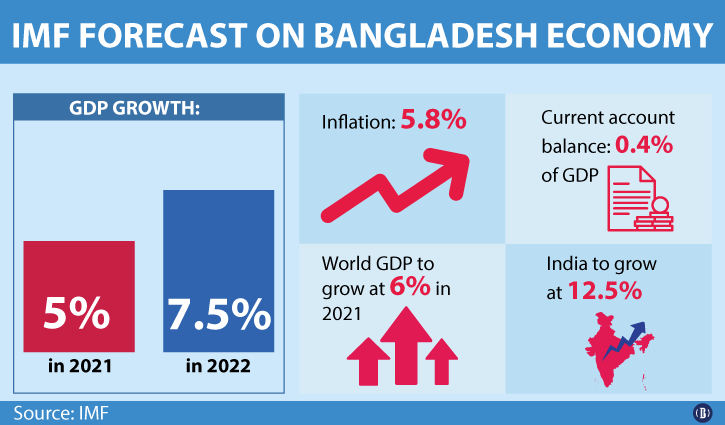India to overtake Bangladesh in per capita GDP this year
BI Report || BusinessInsider

The International Monetary Fund (IMF) in its latest report keeps Bangladesh’s GDP growth forecast unchanged at 5 percent despite it has upgraded the global economic growth
The International Monetary Fund (IMF) in its latest report keeps Bangladesh’s GDP growth forecast unchanged at 5 percent despite it has upgraded the global economic growth.
IMF projected the global growth to be 6 percent in 2021, up 0.8 percentage point from its October 2020 projection, according to its biannual World Economic Outlook report released on Tuesday.
The latest economic outlook report forecast that India will grow at a robust 12.5 percent this year, meaning that it will comfortably surpass Bangladesh’s per capita GDP income. The IMF’s October 2020 report had said as India’s economy contracted massively – by 10 percent – it will go below Bangladesh in terms of per capita GDP at the end of last year.
According to the IMF, Bangladesh’s per capita GDP was $1,888 in 2020 and India’s $1,877. However, if India grows at 12.5 percent this year, as per IMF’s projection, its GDP per capita will easily be more than Bangladesh.
Among advanced economies, the United States is expected to surpass its pre-Covid GDP level this year, while many others in the group will return to their pre-Covid levels only in 2022, finds the report.
It said similarly, among emerging market and developing economies, China had already returned to pre-Covid GDP in 2020, whereas many others are not expected to do so until well into 2023.
“We are now projecting a stronger recovery in 2021 and 2022 for the global economy compared to our previous forecast, with growth projected to be 6 percent in 2021 and 4.4 percent in 2022,” said the IMF report.
Nonetheless, the outlook presents daunting challenges related to divergences in the speed of recovery both across and within countries and the potential for persistent economic damage from the crisis, it said.
The IMF said high uncertainty surrounds the global outlook. Future developments will depend on the path of the health crisis, including whether the new COVID-19 strains prove susceptible to vaccines or they prolong the pandemic; the effectiveness of policy actions to limit persistent economic damage (scarring); the evolution of financial conditions and commodity prices; and the adjustment capacity of the economy, it says.
























